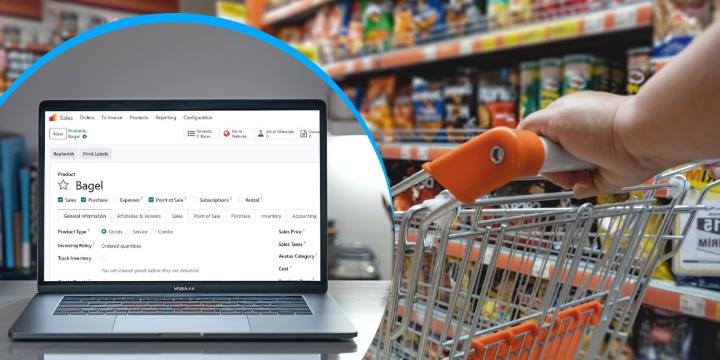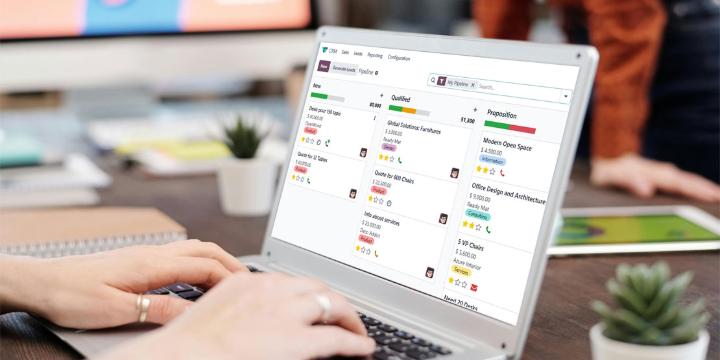Odoo ERP Customization for FMCG Operations
Odoo ERP can integrate with Fast-Moving Consumer Goods operations to dramatically improve efficiency, streamline processes, and enhance general business performance. Due to its flexibility and comprehensive set of applications, Odoo is the most suitable for FMCG companies with a wide range of operations they wish to control efficiently. Customization of Odoo ERP for FMCG operations is discussed herein by explaining some of its features, benefits, problems, and strategies for implementation.

Understanding FMCG Operations
FMCG companies operate with products that turn over quickly and sell at relatively low prices. Some examples of these are food, drinks, toiletries, and other consumable items. The most important characteristics of operations from FMCG include:
High Volume Sales
FMCG products have a high volume of sales.
Rapid Inventory Turnover
Frequent replacement of goods due to increased demand is needed.
Short Shelf Life
Most FMCG items are time-sensitive due to expiration dates, thus requiring careful management of inventories.
Diverse Channels of Distribution
FMCG companies mainly sell products through multiple channels such as retail stores, e-commerce platforms, and direct selling.
Considering these characteristics, an ERP system like Odoo might be helpful in streamlining and taming the complexities of FMCG operations.

Key Features of Odoo ERP for FMCG
1. Stock Management
Odoo allows for advanced stock management with real-time stock monitoring, auto-reorder points of products, and easy management of several warehouses. This is the most important feature in managing optimum stock.
2. Sales Management
The sales module manages customer orders, quotations, and invoices. It goes quite well with inventory to ensure that all the sales data are perfectly accurate and updated.
3. Supply Chain Management
Odoo's supply chain management services help plan and execute procurement processes better. It even helps manage the tracking of suppliers and vendor relationships in terms of purchase orders.
4. Customer Relationship Management (CRM)
The CRM module from Odoo can be used to effectively manage relationships with customers engaged in FMCG businesses. It provides tools for managing leads, customer data, and the analysis of behavior to improve on delivery service.
5. Reporting and Analytics
Odoo has very strong reporting tools that focus on sales performance, inventory amounts, and financial metrics. These analyses are crucial in making informed business choices.
6. E-commerce Integration
FMCG companies selling online can utilize the e-commerce capabilities of Odoo to integrate the portal seamlessly with its online stores. This integration ensures that the product listings are synchronized, the orders are fetched from multiple channels, and the fulfillment process remains streamlined.
7. Mobile Accessibility
Odoo's cloud-based platform enables access from anywhere at any time through mobile devices. This feature is particularly helpful for field sales teams and warehouse managers who require real-time data on the move.
Customization Requirements for FMCG Operations
Even though Odoo offers an all-around set of features, some customization may be required to fulfill specific needs of FMCG businesses. Some common areas where customization are useful:
1. Custom Dashboards: Dashboards can be designed to show KPIs specific to the FMCG business, such as sales trends by product category or geographies.
2. Automated Workflows: Workflows can be customized to automate routine tasks like order processing or updating in the inventory list when the particular conditions are met, such as low stock alerts.
3. Integration: Most FMCG companies use other third-party applications - for example, accounting packages or marketing software. Custom integration ensures better data flow between such applications and Odoo.
4. Interface: The user interface can be customized to provide better usability. For instance, the navigation can be made easier or certain forms are designed specifically to capture information relevant to FMCG.
5. Additional Reporting Tools: Though Odoo offers standard reports, reporting tools can be developed based on specific business analytical requirements.
Advantages of Customizing Odoo ERP for FMCG
1. Improved Productivity: Custom workflow and automatic procedures eliminate manual efforts by including staff in more strategic work rather than routine work.
2. Reduction in Data Error Levels: Intermingling different functions into one system as well as customized entry forms for data reduce error levels linked with its manual handling.
3. Better Decision Making: Easy access to real-time data analytics allows managers to make decisions immediately, considering the prevailing market scenario and operational performance.
4. Customer Satisfaction: Improved processes translate into faster order filling and better delivery services, thus raising the level of customer satisfaction in a competitive marketplace.
5. Scalability: Customized solutions help businesses scale their operations with minimal disruption as the business grows or in response to ever-changing market conditions.Disadvantages of Implementing Odoo ERP for FMCG
1. Resistance to Change
Employees may resist a new system due to fear of not knowing the new system or the fear of technology.
2. Problems in Migrating Data
The process of migrating existing data from legacy systems into Odoo can be quite tricky, and much time is spent achieving data integrity.
3. Customization Costs
Customization brings its own set of benefits; however, it also incurs a cost if not managed properly.
4. Continuous Maintenance Requirements
Customized systems need updating and periodic maintenance for the system to continue to operate correctly as changes in business needs evolve.
5. Training Requirements
Employees will require training on how to deploy the new system effectively for application; this can take time and resources.
Customizing Odoo ERP for FMCG operations has significant advantages in terms of efficiency, accuracy, and scalability. Most particularly, firms can streamline their operations with enhanced inventory management capabilities or automated workflows while improving customer satisfaction levels in a competitive marketplace by customizing the system according to their own business needs. Challenges do appear in the implementation, for example, when employees resist changes or when data migration turns problematic; however, proper planning and execution leads to a great integration process that brings growth and operational excellence into fast-moving consumer goods.
Frequently Asked Questions
1. Which database is primarily used by Odoo?
The ERP software Odoo uses Postgres Database as it primary database.
2. What are all the sectors that Odoo customization services can help?
The odoo customization can help in the sectors like Manufacturing, Trading, FMCG, Hospitality, Sales
3. Which is the best Odoo ERP customization partner for FMCG Operations?
odoo-developers.com is the best Odoo ERP customization partner for FMCG Operations.
Read More:
What is the Salary of Odoo Developers?
What are the benefits of Odoo Development?
How to Evaluate and Choose the Right Odoo Programmer for Your Project?